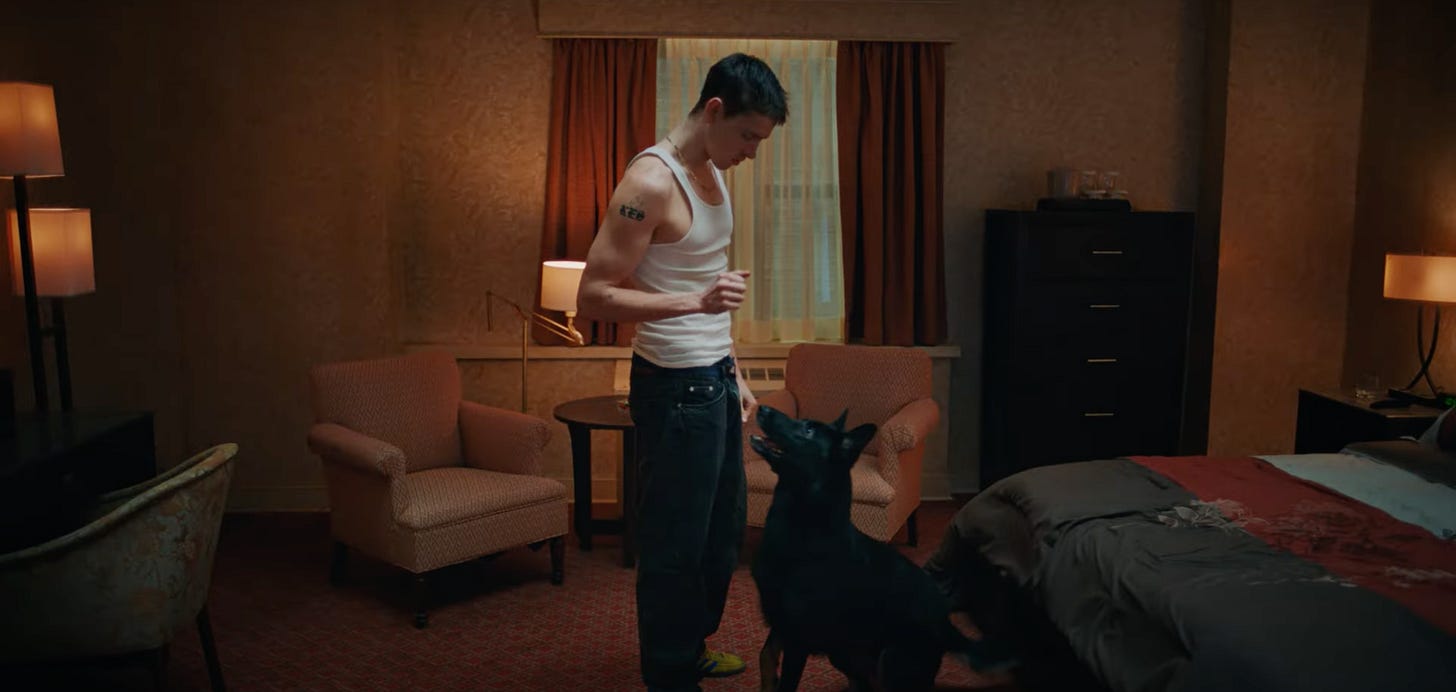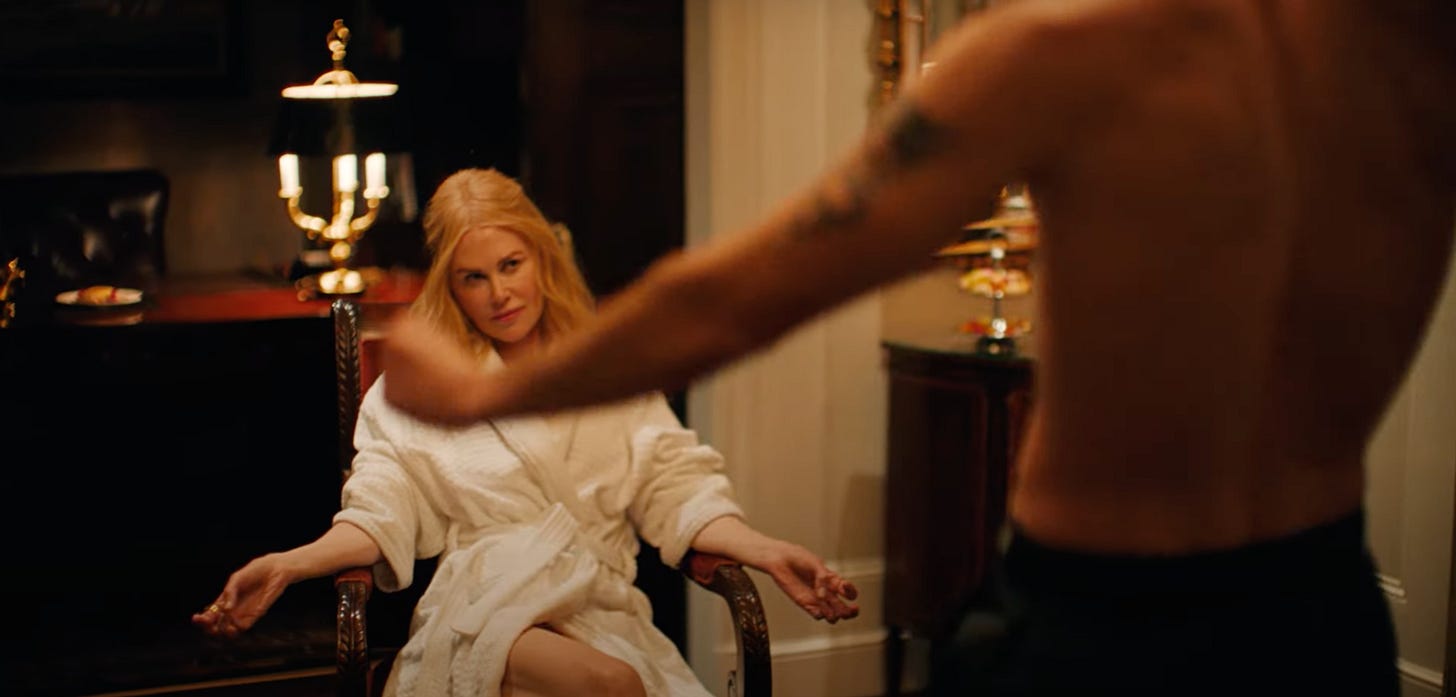How “Babygirl” Fails as an Erotic Thriller But Succeeds as Something Else

When I hear “erotic thriller,” I think of stories about unhinged obsession, stalking, and murder. I think Basic Instinct when crime novelist Catherine Tramell (Sharon Stone) spreads her legs and bears her vulva to the cops investigating her for manslaughter. I think Fatal Attraction with Alex Forrest (Glenn Close), who has an affair with a married man. After he ends the relationship, she leaves his daughter’s pet rabbit boiling in a pot for the family to find in their kitchen. I think of Gus Van Sant’s campy To Die For, with our then-young “babygirl,” Nicole Kidman, playing Suzanne Stone, a sociopathic fish in a small pond with big dreams of becoming a television journalist. To achieve her goals, Suzanne seduces a high school student, Jimmy (19-year-old Joaquin Phoenix), and convinces him to murder the husband standing in her way.
Films such as these cast the erotic thriller as neo-noirs, following the hypersexual and ferociously enterprising femme fatale on an unsubtle killing spree or some other path of destruction. With this in mind, if you’re expecting or hoping that Babygirl will satiate you with familiar scenes of dark and lustful infatuations, this movie will surprise you—perhaps even bore you—with its tameness and compassion toward the submissive good girl.

Even though Babygirl casts Kidman in the center of a salacious film, hearkening to a genre that flourished during the rise of Kidman’s career in the 1980s and 90s, the film is misbranded as an erotic thriller. Arguably, it’s neither erotic (in the sense that it aims to arouse sexually) nor a thriller (in the sense that it excites like a diamond heist movie). So, if you hear the word “erotic” in relation to a plot involving a high-power CEO having an affair with a much younger intern and begin hoping for a BDSM romance akin to Secretary—with swapped power dynamics as the woman assumes the role of the boss—you’re setting yourself up for disappointment. And, if you hear the word “thriller” and anticipate crime-solving, might I recommend you instead watch Jane Campion’s woefully underrated In the Cut with Meg Ryan in her most Nicole Kidman role ever?
Babygirl is better framed as a sympathetic sexual and psychological portrait of Romy Mathis, a wealthy and successful CEO, wife, and mother who is forced to confront the carnal fantasies that shame her. Romy represses her desires, believing they are byproducts of trauma from a childhood spent growing up in a cult (an origin story briefly glossed over in a short conversation between Romy and her assistant). She also fears that these desires will catastrophically and irrevocably undo her self, career, and family.

While promoting the film, director and writer Halina Reijn noted her intent to rewrite Kidman’s role in Eyes Wide Shut, in which she plays Alice, the wife consumed by her extramarital fantasies. Eyes Wide Shut and similar narratives emphasize the Odysseus-as-modern-man-Leopold-Bloom figure, who goes on an odyssey while contemplating his wife’s faithfulness or lack thereof. In Reijn’s reframing of this trope, the yearnings of the wife, not her husband, take center stage.
What’s more, the film neither villanizes nor lets Romy off the hook as it forces her to take accountability for her adulterous fantasies and actions, both of which render her culpable. Remarkably, instead of leading her to a Greek tragedy ending where she loses everything, the truth about her sexual preferences sets her free.

In a moment of inevitable confrontation between Romy’s husband, Jacob (Antonio Banderas), and her lover, Samuel (Harris Dickinson), Jacob tries to convince Samuel that Romy has used and exploited him as an older, more powerful woman. Samuel calmly retorts that because Jacob has an outdated view of sexuality, he cannot understand their relationship. Through this misunderstanding between generations, the film signals that it isn’t your typical erotic thriller from thirty years ago. Challenging ideas about what constitutes pathological sexual behavior, Babygirl insists that the woman with non-normative desires is no longer the manic, knife-wielding Alex Forrest. Instead, she’s the cool-headed, nurturing Romy Mathis who offers you frozen peas to soothe the wounds you acquire while fighting for her.
Another notable tension between generations occurs as Romy’s young assistant, Esme (Sophie Wild), demands that the company embrace a mission to hire and uplift female leaders. Towards the film’s conclusion, Esme forces Romy to present herself as a feminist role model who won’t let down the younger generation of ambitious women who idolize her by flaunting her affair with an intern, thereby behaving like a stereotypical male CEO. If this “thriller” has any genuine moments of blackmail, it comes from Esme, who, even while threatening Romy, does so in order to help her succeed. In this way, Reijn flips the script of the erotic thriller again, depriving her audience of dirty female rivalry, notoriously depicted in movies like Single White Female.

The thrills in Babygirl are purposefully understated as Reijn focuses on Romy’s acceptance of herself and her sexual passions, which, in the end, don’t blow up her life. These passions also don’t satisfy the voyeuristic desires of the stereotypical erotic-thriller-loving audience, who might begrudge the film for its lack of extortion, gore, excessive nudity, and psychopaths. Even the title, Babygirl, is meant to betray tenderness, not menace.
As an erotic-thriller-loving audience member, I wouldn’t have blamed Reijn if she had rehashed the hackneyed motifs of this genre. However, the pleasure and genius of this film is that it gives us something different. Moreover, it is beautifully executed with handheld shots that don’t promote vertigo and a soundtrack that never takes you out of the tense ecstasy the film exhibits through Romy’s grunting, reluctant orgasms.

Additionally, Harris Dickinson kills it as the poorly-dressed and boyishly awkward sexual healer with a ponderously bad but sexy haircut. While the movie makes you anxious with the expectation that Samuel is always about to take Romy down, the dust settles with them on equal footing. Both remain uncertain about each other and fumbling with their intimacy. To this end, during a scene in which Romy and Samuel play and dance to George Michael’s “Father Figure,” the movie leaves you pondering who the father figure is supposed to be, Romy or Samuel.

If you haven’t seen the film yet, leave your expectations for a redux of Dressed to Kill at the door. Allow Reijn to show you what a new age of erotic cinema looks like. After that, if you still hate it, fine. Just don’t hate it because it’s not the overplayed and dated erotic thriller you were expecting.
Find my other posts here.
Subscribe to my Substack here.
